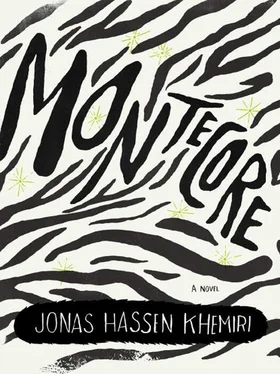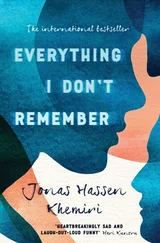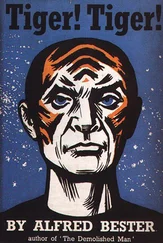“Express honestly — certainly our likeness does not bear likeness?”
Your father held Rachid’s photo before him. And I must admit. The likeness was not large. It was identical. It was the same person holding a turkey in the photo from the souk of 1984 in Jendouba who sat across from me in the year 2000 in Tabarka. The same heavy eye bags, the same sorrowful gaze, the same silvery hair with a blank patch, each hidden by an accouterment. Your father with a beret. Your grandfather with a keffiyeh. It was as though the common experience of losing a relationship with one’s son for political motives had left exactly equivalent marks in their faces.
“Wow,” I said.
“Wow,” said your father. “But then who is that Moussa?”
“Perhaps a result of your mother’s imagination?”
Your father nervously rubbed his forehead and found no response. Later that same night he knocked my door. As usual, I sat connected to the global world net, searching for new comedy series.
“This is going to sound like a bad joke, Kadir. But I need to borrow a little economy. I promise that you will get it back soon. I must take my last chance to not make the same mistake as my father. I will NOT LET FEAR OF POLITICAL CONSEQUENCES SEPARATE ME FROM MY SON!!!”
I smiled him and delegated him my economy. The next day he had disappeared. Again. His tradition true, he had made his leaving into a surprise. He had collected his photo equipment, closed his studio, and left Tunisia.
Can you guess where your father traveled? In the autumn of his age, he journeyed out in the world to dedicate his life to the defense of the weak. Since that day he has not squandered a single frame to pets, touristic humor motifs, or veil-inspired erotica. Instead, his constantly changing aliases present photos of American war crimes in Afghanistan, African war tragedies, and negative environment effects of multinational companies. Under the name Paul Vreeker he has photographed Iranian asylum seekers who sewed up their mouths with needle and thread in protest against Holland’s strict immigrant rules. In Hong Kong he has photographed South Vietnamese child prisoners, in the U.S.A. he has photographed steel barriers that have been erected to shut out Mexican immigrants. He has also documented Chinese slave factories and Palestinian children’s scars from “rubber bullets” (constructed from pointy steel).
Via the global world net I have followed your father’s goldish success. When he is not photographing, he is establishing close relations to political intellectuals all over the world. He drinks righteously pressed juice with Sting, he brunches with writers like Arundhati Roy, and once a month he plays traditional Scrabble with Noam Chomsky. And do you know that song by Bono and U2 called “Even Better Than the Real Thing”? Guess to whom it is dedicated! It is a song of homage to your father! (Verify the CD’s interior in the American version yourself.)
But despite all this, he is a very solitary man. He always misses his family. He mourns his nonexistent relation to his sons. But he does not know how he should seek their excuse. On the other hand, he knows with magnificent certainty that he will NEVER let himself be trampled upon again. Never again will your father let himself be duped into integrating. Never again will you see him compromise himself in the hunt for finances. It is not worth it. And perhaps this is a discovery your father made too late in his life …
Do you want to know how the book should be terminated? With a magnificent final scene where the now-published author (= you) reencounters his disappeared father as the result of chance.
Let us first show how you leave your apartment on a nightly walk. You wander your sorrowful steps around Stockholm, you are tired after yet another night of fruitlessly writing, you are taxed by the gazes of passersby, you hope no one recognizes you, you regret all the words you have ever written. You miss your father. Stuff the scene with severe depression, tragic strings, dark rain clouds, stormy winds, bending rain forests, shot-down small birds. Everything is sorrowful like in Otis Redding’s “Fa-Fa-Fa-Fa-Fa (Sad Song).”
Then … as you cross the bridge from Gamla Stan in toward Kungsträdgården, your eyes are captured by the gigantically large chestnut tree that stretches its embrace toward heaven. You stop, you look at the tree, you squeeze the old chestnut that your father gave you without you remembering why. You are just about to wander on when you discover another person standing at exactly the same angle on the other side of the park. He has a newly transplanted virile ponytail, his shoes are Gucci, his exterior signals a very rich and successful man. You reflect each other’s eyes and you suddenly realize that it is your sunburned father!
Without thoughts of historic conflicts you both roar your happiness, rush your steps toward each other, hug each other’s bodies, sprinkle phrases of greeting in French, Arabic, Swedish. Change the scene to euphoric happiness! Let the sun begin to wake in the east, let taxicabs make cheering honkings, let the paperboys, the homeless, and nocturnal fishermen start a gradually growing American film applause, one by one, with tear-filled cheeks, they start to applaud a son’s and a father’s rediscovered relation. Everything is jubilation like in Otis Redding’s “Dum-Dum-Dum (Happy Song).” Chestnuts rain from the tree, your eyes smile, and with exactly mirror-image mouths you both say the phrase:
“All I have wanted in my entire life is for your pride in me to be as eternal and universal as my pride in you.”
Then you stop short, sharing first surprised looks and then laughs of relief.
Then let the reader see how you and your father, in the accompaniment of happiness, wander away toward Gamla Stan, you nostalgize the Dynamic Duo, you point at some light blue traces of paint, laughing. The last thing the reader hears is your father, who says:
“My isolation from my family became too severe. I was depressed so heavily that I was ready to do anything to rediscover my relation to my family. I was even ready to let an antique friend correspond you e-letters that perhaps exaggerated the success of my current status. All so that you would understand the choices I have made in life.”
The reader sees how you smile at your father and promise him your eternal friendship and forgiveness. Your silhouettes disappear in a carefully awaking haze of heat while the reader remains standing teary-eyed under the chestnut tree. The reader bends to the ground, transports a chestnut into their pocket, and then wanders toward home in time with the waking sun. The reader smiles and thinks: This was truly a brilliant book about a brilliant man!
FURIOUSEST GREETINGS!!!
Your document has been delivered me. I have read it. Carefully. Every phrase. Let me try to control my burning fingers in an attempt to find at least ONE positive surprise about your text.
Pff.
Calm …
Calm.
The idea of initiating the book with my prologue and my authentic e-letter to you is not so stupid, not to say rather intelligent. My phrases become the first tones in what will become your father’s symphony. Unfortunately it will soon turn out that the symphony is sooner a total FIASCO! Let me dissect your flat-fall point by point.
My premier disappointment was the title of the book. Why have you named the book Montecore — The Silence of the Tiger despite my opposition? Google indicates that Montecore was a white tiger that was trained by the celebrated tamer duo Siegfried & Roy in Las Vegas. But where is the reference between this tiger and your father? Why not a more adequate title like My Father: The Man, the Myth, the Legend ? Or My Father: The World-Internationally Celebrated Photographer ? Or a Proustish name in order to butter up the critics: In Pursuit of the Dad (and the Time) That Was Lost ? Even if you persist in guarding your ridiculous title, you still MUST suppress all the scenes in the book with Siegfried & Roy. Why do you let their white-draped sequin bodies escort your father from Algeria to Jendouba to Stockholm to New York? Why do they whip in the air, why do they speak German-Swedish about their notorious tiger control, and why, write me why, is poor Roy covered in blood with his stomach half scooped out in the final scene of the book? Is this in order to motivate the title of the book? Suppress ALL of this!
Читать дальше










